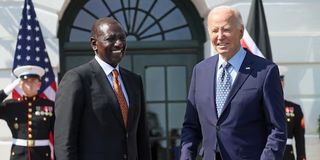Premium
US expected to designate Kenya as major non-NATO ally, source says

U.S. President Joe Biden welcomes Kenyan President William Ruto at the South Portico of the White House in Washington, U.S., May 22, 2024.
What you need to know:
- On Wednesday, Biden said he and Ruto would launch a new era of technology cooperation between the two countries that would include work on cyber security, artificial intelligence and semiconductors. He did not mention the security designation.
- The U.S. will also announce $250 million in new investments through the U.S. International Development Finance Corporation (DFC), expanding the U.S. financing agency’s portfolio in Kenya to over $1 billion, DFC said.
U.S. President Joe Biden is expected to designate Kenya as a major non-NATO ally during a three-day state visit by Kenyan President William Ruto this week, a source familiar with the plans said.
Kenya would be the first sub-Saharan African country to receive the designation, reflecting Washington's drive to deepen relations with the East African nation, which has long also had close relations with Russia and China.
As he welcomed Ruto to the White House for a meeting with business executives, Biden told reporters he planned to visit Africa in February, following the U.S. presidential election. The two leaders will meet again in the Oval Office on Thursday, followed by a joint news conference and a state dinner.
Senior administration officials said Biden and Ruto would discuss a range of issues from trade to debt relief and the way forward for Haiti, Ukraine, Sudan and other areas during their meeting.
On Wednesday, Biden said he and Ruto would launch a new era of technology cooperation between the two countries that would include work on cyber security, artificial intelligence and semiconductors. He did not mention the security designation.
The U.S. will also announce $250 million in new investments through the U.S. International Development Finance Corporation (DFC), expanding the U.S. financing agency’s portfolio in Kenya to over $1 billion, DFC said.
Both countries share a commitment to ensuring technology is developed and deployed in a manner that advances transparency, accountability, and human rights, a U.S. official said.
Kenya, like the United States, has become "an engine for innovation", the official said, citing its $1 billion “Silicon Savannah” technology hub that is home to more than 200 startups spanning a range of sectors, including clean energy, microelectronics, financial technology, and e-commerce.
Businesses that took part included Alphabet GOOGL.O; Baylis Emerging Markets, a private equity firm specializing in African markets; BasiGo, a Kenyan electric bus company; Teneo, a global CEO consulting and advisory firm, and Gearbox Software, which is an American video game development company.
Washington also plans a new semiconductor partnership with Kenya, and is working with Congress to make it the first country in Africa to benefit from funding through the U.S. CHIPS and Science Act of 2022, an administration official said.
Biden's designation of Kenya as a major non-NATO ally comes as it is preparing to send forces to Haiti as part of a U.N.-led force deploying to address the security crisis in the Caribbean.
The designation is granted by the United States to close, non-NATO allies that have strategic working relationships with the U.S. military.
The White House had no immediate comment.
Biden in March designated Qatar as a major non-NATO ally of the U.S., fulfilling the promise he had made to Qatar earlier in the year.
Gyude Moore, head of the Africa Initiative at the Center for Global Development, said Kenya had proven to be a dependable and reliable partner for the U.S. at a time when South Africa was pursuing its own more independent foreign policy.
Cameron Hudson, a fellow at the Center for Strategic and International Studies, said the move would formalize a shift that has seen Kenya "move more squarely into a U.S. orbit" in recent years, including greater cooperation on Somalia.
"It's very significant. No other sub-Saharan African country has it," he said.





